Colonoscopy Prep Instructions
Patient instructions: Bowel prep for colonoscopy, diet, medications and transportation
Taking the colonoscopy prep medicine
Bowel prep for colonoscopy involves taking a laxative medication and restrict your diet to clear your colon of stool so that the doctor can clearly see any abnormal areas in your colon during the procedure. If your colon is not completely emptied, the chances your doctor will miss abnormalities increases, and you may even have to repeat the procedure.
By the day before your test, you should already have your bowel prep. Your doctor may have prescribed and sent the bowel prep medication to your pharmacy or may have instructed you to take a bowel prep that is over the counter. Alternatively, your doctor may have requested that the bowel prep be mailed to you. Typically, bowel prep medication is a solution that you will need to drink starting one day before your procedure. You will be asked to take the colon prep in two doses: the first dose, 3-6 pm the night before your procedure; the second dose, 6-8 hours before your procedure.
What to expect from the colon prep medication
- You will develop significant diarrhea after drinking the preparation. Plan to be near a bathroom. This is normal as it means the medication is working to clear stool from your colon.
- Most people feel mild bloating and mild abdominal cramps. This is normal. Drinking the prep medication more slowly and over a longer period can help alleviate these symptoms.
- A well-prepared colon produces yellow liquid. Please finish your preparation regardless of your stool color.
Bowel prep medication options
One bowel prep medication type may not be right for everyone, and you should always use the bowel prep medication that your doctor has directed you to use. Bowel prep for colonoscopy instructions are listed below by medication type for your convenience: CLENPIQ®, GoLYTELY®, MiraLAX®, MoviPrep®, PLENVU®, Suprep® and SUTAB®.
The instructions are available in English and en Español.
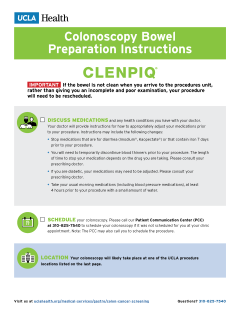
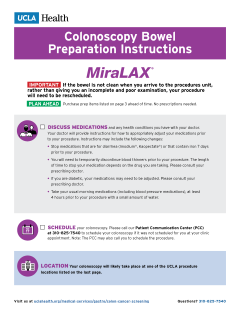
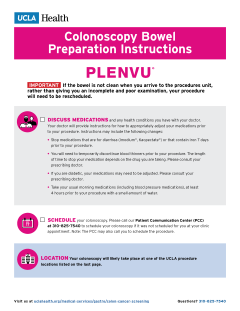
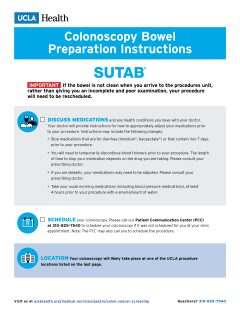
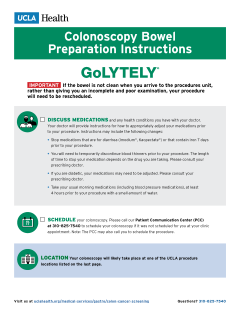


Diet for colonoscopy prep
Three days before your procedure, you should begin a “low-residue diet” to limit high-fiber foods, which your colon takes longer to clear.
High-fiber foods that you should avoid include:
- Whole-grain breads, oatmeal/cereals, granola
- Nuts, seeds, raw/dried vegetables or fruit (NO salads)
- Beverages with pulp
- Nutritional supplements that contain fiber
- Pepper, beans, corn/popcorn
Foods that you may eat include:
- Cream of wheat/grits, white rice, refined pastas/noodles
- Cooked fresh/canned vegetables and vegetables without seeds including asparagus, beets, carrots, mushrooms, green beans, potatoes without skin
- Bananas, soft cantaloupe, honeydew, avocado
- Chicken, fish, beef, pork, tofu, eggs
- Margarine, butters/oils, smooth sauces and dressings
- Cakes, cookies, pudding, ice cream without nuts or seeds, hard candy, popsicles, yogurt, and cheese
Beginning one full day before your procedure, you must begin a clear liquid diet, which means that you should NOT eat any solid foods and should ONLY drink clear liquids. For example, if your procedure is on Thursday morning, you should not eat any solid foods for Wednesday breakfast, lunch, and dinner and should only drink liquids that are clear. Aim to drink at least 12 tall glasses (about 8-10 ounces each) of clear liquids throughout the day in addition to what you drink with your bowel prep solution/medication.
A clear liquid diet consists of drinking only “clear” liquids, such as:
- Water
- Mineral water
- Clear fruit juices without pulp (apple, white grape, white cranberry, lemonade, etc)
- Clear soft drinks
- Clear sports drinks
- Broth (chicken, beef, vegetable, or bone broth)
- Popsicles or gelatin (such as Jell-O)
- Coffee or tea (without milk)
- Ensure clear or other clear meal-replacement drinks
Alcohol can make you dehydrated and you should not drink alcohol while preparing for your test.
Beginning four hours before your procedure, you should STOP drinking clear liquids. This means that you should not have anything to eat or drink beginning four hours before your procedure.
After your procedure, you will be able to resume a normal diet, unless otherwise instructed by your doctor.
Medications
- You can take most prescription and non-prescription medications right up to the day of the colonoscopy.
- Stop medications that are for diarrhea (Imodium, Kaopectate) or contain iron 7 days prior to your procedure.
- Blood thinners may need to be temporarily discontinued prior to procedure. The length of time you will need to stop your medication depends upon which drug you are taking. If you are on a blood thinner, you should consult with your prescribing doctor about whether you should continue or discontinue these medications. Do not stop these medications without first talking to your doctor. You will restart these medicines after the procedure, unless otherwise directed by your doctor.
- Low-dose aspirin can be continued and does not need to be stopped prior to your colonoscopy.
- Insulin/diabetes medication doses may need to be adjusted. Consult your prescribing doctor.
- Blood-pressure medicines should be continued while preparing for the test. On the day of your test, you should take your blood-pressure medicine with water at least two hours before your test.
- You will need to temporarily discontinue GLP-1 medications (such as Ozempic or Trulicity) prior to your procedure.
- Take your usual morning medicines, especially those for blood pressure, at least four hours prior to your procedure with a small amount of water.
Transportation
You must have someone accompany you home the day of your procedure, even if you take a cab. You will not be able to drive yourself home. You can also use public transportation (taxi or bus), but only if you have an adult who can escort you home. Medical transport may be arranged for safe transportation home. The medical procedure staff must be able to contact whoever will accompany you. If this person cannot be confirmed prior to the procedure, your procedure will be rescheduled for your safety. You should not drive a car, operate machinery, return to work, drink alcohol, or make any legal decisions the after your procedure until the following day.